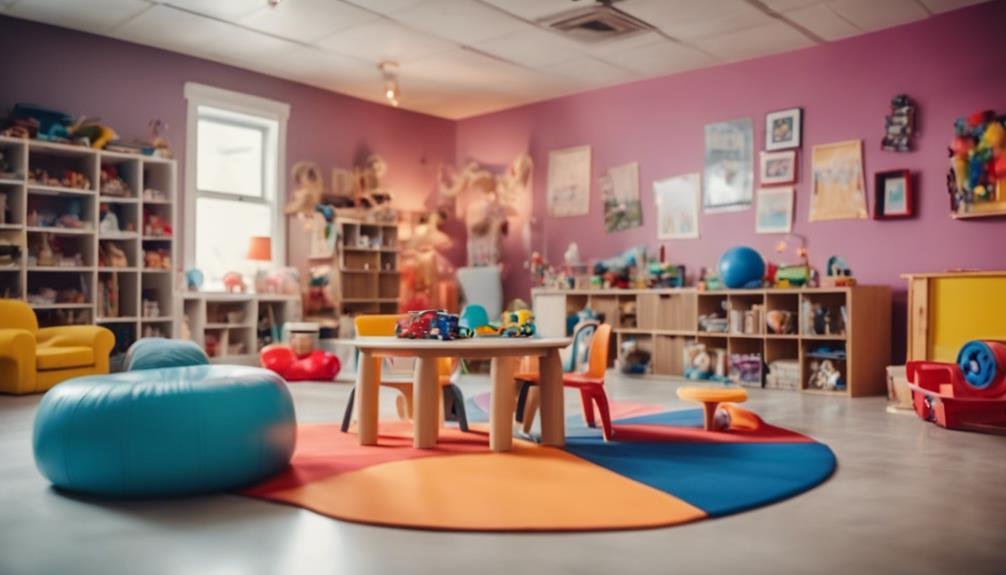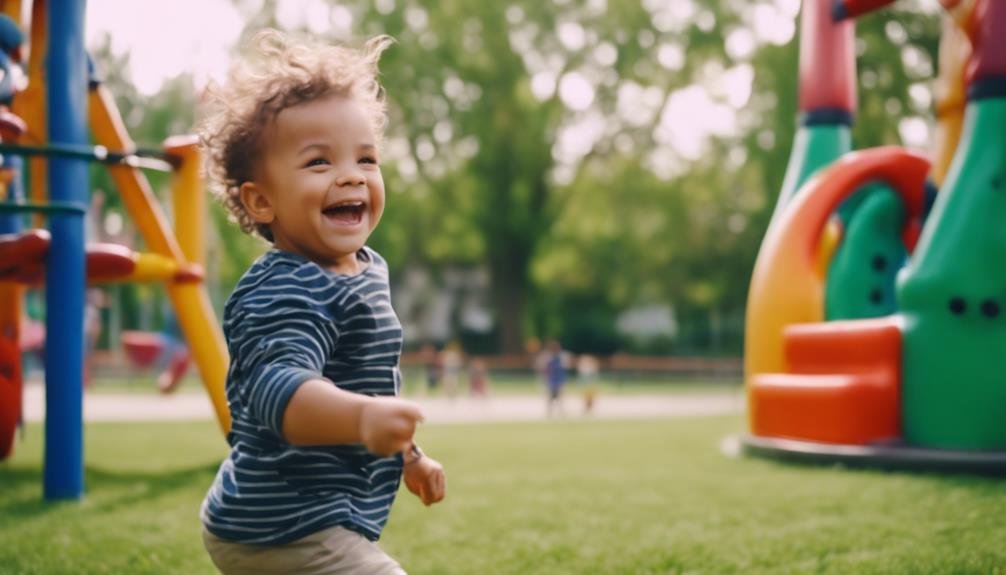"Cherishing Little Steps - A Haven for Baby and Family Journeys"
The Role of Physical Activity in Toddler Health: A Parent's Guide
As a parent, you know that the well-being of your toddler is a top priority. But have you considered the crucial role that physical activity plays in your child's health? It's not just about running around and burning energy; there are specific benefits tied to their growth and development that might surprise you. By understanding the importance of movement and incorporating certain activities into your daily routine, you can set the foundation for a healthier future for your little one. But what exactly are these benefits, and how can you ensure your child is getting enough physical activity?
Key Takeaways
- Parents shape toddler habits.
- Physical play aids social skills.
- Enhances motor skills and bones.
- Promotes cardiovascular health.
- Establishes foundation for healthy habits.
Importance of Physical Activity

Understanding the significance of physical activity for toddlers is crucial for promoting their overall health and development. As a parent, you play a vital role in shaping your child's habits and behaviors, including their approach to physical activity. Toddlers who engage in regular physical activity experience numerous benefits that contribute to their well-being. By encouraging your child to be active, you're laying the foundation for a healthy lifestyle that can have lasting effects.
Physical activity helps toddlers develop important motor skills, improve their coordination, and build strong muscles and bones. It also enhances their cardiovascular health and promotes better sleep patterns. Additionally, engaging in physical play fosters social skills as children learn to interact and cooperate with others. By making physical activity a fun and integral part of your child's daily routine, you're setting them up for a lifetime of good health and wellness. Your involvement and support in their physical endeavors are key to instilling healthy habits that will benefit them now and in the future.
Health Benefits for Toddlers
Encouraging your toddler to participate in regular physical activity not only promotes their overall health and development but also provides them with a range of health benefits that contribute to their well-being. Physical activity helps strengthen your toddler's muscles and bones, supporting healthy growth and development. It also aids in improving their coordination, balance, and flexibility, essential skills they'll use as they explore the world around them.
Regular exercise for your toddler can boost their cardiovascular health, promoting a strong heart and efficient circulation. This can lead to better endurance and stamina, allowing them to engage in play and activities for longer periods without getting tired quickly. Additionally, physical activity plays a crucial role in maintaining a healthy weight in toddlers, reducing the risk of obesity and related health issues.
Moreover, engaging in active play can enhance your toddler's mood and mental well-being, promoting better sleep patterns and reducing feelings of stress or anxiety. By incorporating regular physical activity into your toddler's routine, you're setting the foundation for a lifetime of good health habits.
Types of Recommended Activities

To promote your toddler's health and development effectively, it is essential to incorporate a variety of recommended physical activities into their routine. Engaging in different types of activities helps in enhancing their motor skills, coordination, and overall physical fitness. Here are some types of recommended activities that you can introduce to your toddler:
| Type of Activity | Description | Benefits |
|---|---|---|
| Active Play | Running, jumping, and playing outdoors | Builds strength and endurance |
| Dance | Grooving to music and following simple routines | Enhances balance and flexibility |
| Swimming | Water play and basic swimming skills | Develops cardiovascular fitness |
| Yoga | Simple poses and breathing exercises | Promotes relaxation and focus |
| Obstacle Courses | Setting up fun challenges indoors or outdoors | Improves agility and problem-solving skills |
Incorporating Movement Into Daily Life
How can you seamlessly infuse movement into your toddler's daily routine to nurture their physical health and well-being? Incorporating movement into your toddler's daily life doesn't have to be complicated. Simple activities like dancing to music, playing games that involve running or jumping, or going for walks together can make a big difference. Try to limit screen time and encourage active play instead. Toddlers are naturally curious and energetic, so take advantage of that by providing opportunities for them to explore and move their bodies.
Consider setting aside dedicated time each day for active play, whether it's at a local playground, in your backyard, or even inside on rainy days. Get down on the floor and play with your toddler, showing them that moving their bodies is fun and important. Additionally, involve them in household tasks that require movement, such as helping with simple chores or gardening. By making movement a natural part of their daily routine, you're helping your toddler develop healthy habits that will benefit them for years to come.
Creating a Safe Environment for Play

Creating a safe environment for play is essential for your toddler's well-being and development. As a parent, ensuring that your child has a secure place to explore and play is crucial in fostering their physical and cognitive growth. Start by childproofing your home – covering electrical outlets, securing furniture, and removing small objects that could pose choking hazards. Softening sharp edges and corners can prevent injuries during active play. When outdoors, choose playgrounds or play areas with age-appropriate equipment and soft surfaces like mulch or rubber mats to cushion falls.
Supervision is key; always keep a watchful eye on your toddler during playtime to intervene if necessary. Encouraging safe habits like looking both ways before crossing the street or wearing helmets while biking sets the foundation for a lifetime of safety awareness. Remember, creating a safe environment not only protects your child from harm but also allows them to explore and learn with confidence.
Setting Realistic Activity Goals
When setting realistic activity goals for your toddler, consider their age, interests, and physical capabilities to ensure a positive and achievable experience. It's crucial to tailor activities to your child's unique needs and abilities.
Here are some tips to guide you in setting realistic activity goals:
- Follow Their Lead: Observe what activities your toddler naturally enjoys and use these as a starting point for setting goals.
- Gradual Progression: Start with manageable goals and gradually increase the intensity or duration as your toddler becomes more comfortable and skilled.
- Celebrate Achievements: Acknowledge and celebrate small milestones to keep your toddler motivated and engaged in physical activities.
Encouraging Active Playtime

To foster a healthy lifestyle for your toddler, prioritize incorporating engaging and movement-focused activities into their daily routine. Active playtime is crucial for your little one's development, promoting motor skills, social interaction, and overall well-being. Encouraging active play doesn't have to be complicated; it can be as simple as setting aside dedicated time each day for physical activities.
Try to create a stimulating environment that encourages movement. Offer a variety of toys that promote active play, such as balls, push toys, or ride-on toys. Take your toddler to the park or playground, where they can run, climb, and explore. Consider joining parent-toddler classes that involve physical activities like dancing, swimming, or tumbling.
Engage in active play with your toddler to make it more enjoyable and strengthen your bond. Get down on the floor and crawl, jump, or dance together. Remember, the goal is to make physical activity fun and exciting for your little one, setting the foundation for a lifetime of healthy habits.
Frequently Asked Questions
Can Toddlers Engage in Physical Activities During Illness?
When your toddler is ill, it's important to prioritize their rest and recovery. Engaging in physical activities during illness may strain their immune system further. Consult with a healthcare provider for guidance on the best course of action.
How Can Parents Handle Toddler Tantrums During Playtime?
When handling toddler tantrums during playtime, remember to stay calm and patient. Redirect their focus, offer choices, or create a calming environment. Consistency in your response and positive reinforcement can help manage these challenging moments effectively.
Are There Specific Activities to Help With Toddler's Coordination?
To boost your toddler's coordination, try activities like dancing, tossing a ball, or playing with building blocks. These fun exercises can improve their motor skills and balance while keeping them engaged and entertained.
What Role Does Screen Time Play in a Toddler's Activity Level?
When it comes to screen time, remember moderation is key. Limiting exposure can help toddlers stay active and engaged in physical play. Encourage a balance between screen activities and active play for optimal health.
Should Parents Be Concerned About Competitiveness in Play Activities?
Parents, it's natural to worry about competitiveness in play activities. However, a healthy balance fosters growth. Encourage cooperation and support among toddlers. Emphasize fun, skill-building, and individual progress. Celebrate each child's unique strengths and achievements to promote positive interactions.
Conclusion
In conclusion, remember that physical activity is vital for your toddler's health and development.
Did you know that research shows that toddlers who engage in at least 60 minutes of active play a day have improved cognitive skills and better self-regulation?
By incorporating fun activities into your daily routine and creating a safe play environment, you're setting the foundation for a healthy and active lifestyle for your little one.
Keep up the great work, and keep them moving!


